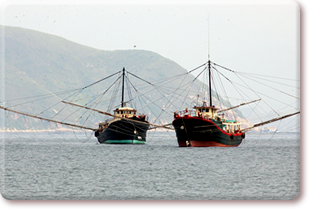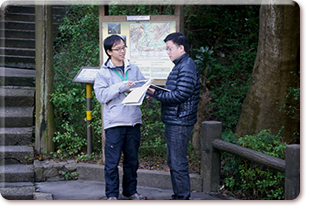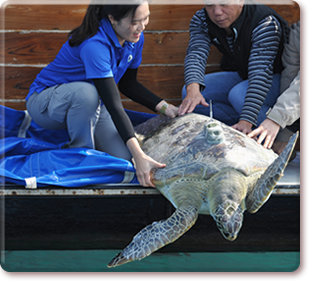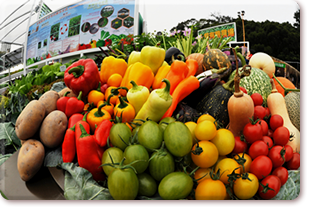Director’s Message
I am pleased to share with you the work of the Agriculture, Fisheries and Conservation Department and the achievements attained in 2012/13 which was a fruitful year for all of us.

Hong Kong waters once had a rich marine biodiversity but the sustainability of our marine resources has aroused much concern in recent years. To avoid further depletion caused by overfishing, a ban on trawling activities was imposed on 31 December 2012 when the relevant legislation came into force. In parallel, a range of fisheries management measures has been put in place to maintain an appropriate level of fishing effort. I look forward to seeing these measures help the depleted marine resources gradually rehabilitate, protect the marine ecosystem and bring the fishing industry back to a sustainable path in the long run.
To stringently enforce the law, the Department has flexibly deployed resources and based on intelligence to step up patrols in a targeted way, and mounted a number of joint operations with the Marine Police in the year. Arrangement for providing ex-gratia grant and one-off compensation to the fishermen and local deckhands affected by the trawl ban has completed while the vessel buy-out scheme is still underway.

The unauthorised excavation works in the country park enclave of Sai Wan a couple of years ago has triggered significant public concern on the protection of country park enclaves in Hong Kong. In response, the Department has invoked the statutory procedures to incorporate three enclaves, namely Sai Wan, Kam Shan and Yuen Tun into respective country parks. The assessment on the remaining enclaves for incorporation into country parks is ongoing.
 Country Parks are indeed another precious resource of Hong Kong. They are not only a holiday attraction for the general public, but also home to many nature species in Hong Kong. Last year, country parks remained a popular destination for various sorts of recreational activities, drawing some 13 million visitors. The Department has put in much effort to enhance facilities to bring more fun and enriched experience to country park visitors. The first biodiversity education centre has been set up near the Tai Tam Country Park and a new mobile application “Country Parks Tree Walks” has been launched in the year. To more accurately gauge the views and expectations of the users, a survey institution was commissioned for the first time to conduct the country parks visitor survey. The findings will be an important reference for enhancements in the future.
Country Parks are indeed another precious resource of Hong Kong. They are not only a holiday attraction for the general public, but also home to many nature species in Hong Kong. Last year, country parks remained a popular destination for various sorts of recreational activities, drawing some 13 million visitors. The Department has put in much effort to enhance facilities to bring more fun and enriched experience to country park visitors. The first biodiversity education centre has been set up near the Tai Tam Country Park and a new mobile application “Country Parks Tree Walks” has been launched in the year. To more accurately gauge the views and expectations of the users, a survey institution was commissioned for the first time to conduct the country parks visitor survey. The findings will be an important reference for enhancements in the future.
In the year, Hong Kong Global Geopark of China has organised a roundtable conference and the first workshop for geopark managers to strengthen geopark network and exchanges. Sister arrangements have been signed with Marble Arch Caves Geopark and Wudalianchi Geopark, bringing the total number of Hong Kong’s sister geoparks to seven. Meanwhile, the construction of a volcano discovery centre scheduled to open in 2014 is in full swing.
Education and publicity has all along been a key area of our work. A wide range of public education activities have been held in the year to meet the needs of the different categories of visitors such as the general public, students and teachers.
On nature conservation, two new Management Agreements at Ramsar Site and Deep Bay Wetland Outside Ramsar Site commenced to sustain the efforts in promoting conservation management of fishponds in the Inner Deep Bay area.

As always, the Department spared no effort in protecting the endangered species. I am pleased to see two hawksbill turtles and a green turtle returning to the wild nature in the year after rehabilitation at the Ocean Park Hong Kong.
With the growing popularity of keeping pets, safeguarding the health and welfare of animals becomes more and more important. A public consultation on the proposed amendment to the Public Health (Animals and Birds) (Animal Traders) Regulations to better regulate pet trade has been launched in the year. Based on the views collected, the Government proposed to increase the maximum penalty, to empower the Director of Agriculture, Fisheries and Conservation to revoke the licence of animal trader convicted of an offence and strengthen the regulation of animal breeders. The Department is now working out the details of the legislative amendments as well as the code of practice with the stakeholders.

Public education is the most effective way to promote kindness to animals. In the year, our colleagues have given talks at schools and housing estate, organised dog training courses, roving exhibitions and animal adoptions days to raise the awareness of the general public. A Roadshow TV programme has been made to promote the re-homing of mongrels and other animals while a DVD has been produced to educate the newly arrived domestic helpers about the dos and don’ts for handling dogs in the public place.
On agricultural support, the Department continued to promote the cultivation of premium vegetables. In the year, four improved varieties, namely long-horn green pepper, round purple eggplant, yellow flesh watermelon and potato were introduced to farmers for production. To help farmers expand their customer base and provide an opportunity for the public to know more and try out the premium local produce, the Department co-organised FARMFEST 2013, at which about 300 stalls showcased a wide variety of local agricultural and fishery products. The event was well-received and attracted more than 170,000 visitors.
I would like to take this opportunity to thank all my colleagues for their hard work and the professionalism demonstrated in the past year. Looking forward, we will continue to respond positively to the changing needs of the community, face up the challenges ahead and strive for excellence in discharging our duties.
Alan Wong Chi-kong
Director of Agriculture, Fisheries and Conservation